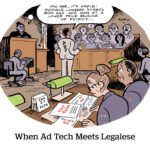WPP is set to knight its new CEO.
Multiple publications Tuesday reported that as early as next week, the holding company is set to name Wunderman and WPP Digital CEO Mark Read the firm’s second-ever chief executive, following the departure of founder and longtime leader Martin Sorrell in April. (Update: WPP confirmed Read’s ascension on Monday)
WPP’s board has spent the past five months searching for Sorrell’s successor, vetting both insiders like Read and longtime WPP exec Hamish McLennan, as well as outside candidates like Oath CEO Tim Armstrong. In July, The Wall Street Journal reported Read was winning the race for the top job.
After speculation following Sorrell’s departure that the board might break up the holding company, Read’s appointment could be a sign that WPP won’t stray too far from its roots after all.
Rise to the top
Who is Mark Read?
Like many holding company CEOs, he’s not your career agency guy. Read has a background in consulting at Booz & Co. and as an ad tech entrepreneur, having started the online loyalty business WebRewards, which he sold to VC firm Bertelsmann in 2001.
At WPP, Read rose from director of strategy to CEO of venture arm WPP Digital and database marketing agency Wunderman. Read was close to Sorrell, whom many say he had been grooming for succession.
Read began to emerge as the new face of WPP following Sorrell’s departure, when he was named co-COO of the group alongside Andrew Scott, WPP’s chief financial officer in EMEA. In the months following Sorrell’s departure, Read oversaw clients and employees while Scott handled the business and financials.
It’s not surprising, then, that as one of Sorrell’s protegees Read shares a similar vision for how to turn around the struggling company, which has been criticized for being slow to adapt to technological and market shifts. In March, WPP suffered its worst stock plunge, wiping $2.6 billion off its market cap.
While Read will leave Sorrell’s famous word, “horizontality,” behind, he maintains that WPP needs to become a more integrated, agile and tech-savvy company to meet client needs. While that might mean selling off some non-core assets, it doesn’t mean WPP necessarily needs to be smaller, but rather must work better together, Read told AdExchanger in June.
“If we look back at WPP in five years, we’ll find a different organization,” he said. “It will be simpler to navigate, more data-driven and more technologically competent. Sometimes we need to leave our agency brands at the door and think about the client and less about ourselves.”
That’s not too different from the strategy advocated by Sorrell, who told AdExchanger in January he wanted WPP to operate as “one company.”
“It irritates me when people say they’re from one agency,” he said. “You should regard yourself as having a functional expertise and provide a totally integrated solution. When you say you’re from tribe A or tribe B or tribe C, you put up invisible walls.”
For Read, the focus is less on implementing a new strategy than executing on the plan Sorrell put in motion, said Pivotal analyst Brian Wieser.
“WPP had assembled the best collection of assets in the industry among their global peers,” he said. “They had the best geographic exposure. They fell down on finding ways to make it all work together and packaging a story that was easily understandable [for] marketers. But at a strategic level, there wasn’t anything wrong.”
Read, however, has a better relationship with the board than Sorrell did, which may make it easier for him to execute, Wieser added.
“There’s likely to be more of the same, just, ideally, better run and with more board involvement,” Wieser said. “There might actually be a chief operating officer, an actual No. 2.”

















